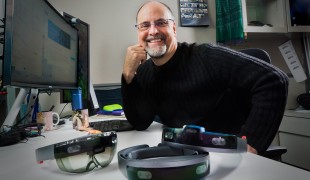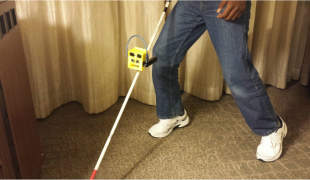- 28263
- 1117
- 40
- 72
- 8
- Help Ukraine
About the solution
Sehbehinderte Menschen können enorme Schwierigkeiten mit der Bewältigung alltäglicher Dinge haben und werden daher oft vollständig abhängig von der Hilfe Anderer.
Die Welt ist entworfen für Sehende, und Sehbehinderte funktionieren schlecht in ihr. Daher wird viel daran getan, ihnen das Leben zu erleichtern, aber es muß noch viel passieren.
Als Pavel Kurbatsky gefragt wurde, warum er anfing, Hilfsmittel für Menschen mit Behinderungen zu entwerfen, zuckte er anfangs mit den Schultern.
„Ich sah daß, obwohl blinde oder taube Menschen genau wie alle anderen sind, sie große Probleme haben, sich in einer Umgebung zu bewegen die nicht für sie entworfen ist,” erklärt Kurbatsky, ein schlaksiger Teenager, förmlich in einem Interview in einem Schlafsaal an der Baumann State University. „Ich entschied, daß ich ihnen in irgendeiner Form helfen könnte”.
Schon einige Jahre davor hatte das junge Genie angefangen, nach Möglichkeiten zu forschen, Technologie einzusetzen, um Menschen mit Behinderungen zu helfen. Im zarten Alter von 9 Jahren erfand Pavel Kurbatsky ein spezielles Thermometer für Sehbehinderte.
Jetzt, mit 18 Jahren, hat er einen speziellen Stock und eine spezielle Brille entworfen.
Der Stock ist mit Sensoren auf drei Ebenen ausgestattet: Kopf, Hüfte und Füsse. Die Sensoren scannen die Umgebung, und sobald man sich einem Hindernis nähert, bekommt man eine akustische Warnung.
Die Brille verfügt über ein eingebautes Kopftelefon und GPS, womit man Informationen über bestimmte Orte für zukünftige Gelegenheiten speichern kann.
Dies ist besonders hilfreich an Orten wie Krankenhäusern, Behörden und in öffentlichen Verkehrsmitteln.
Auszug aus: http://www.themoscowtimes.com/news/article/whiz-kid-invents-talking-walk...
Video:
https://www.youtube.com/watch?v=RHMCANWdIvw
German translation by Ulrike Martens
This solution shall not include mention to the use of drugs, chemicals or biologicals (including food); invasive devices; offensive, commercial or inherently dangerous content. This solution was not medically validated. Proceed with caution! If you have any doubts, please consult with a health professional.
DISCLAIMER: This story was written by someone who is not the author of the solution, therefore please be advised that, although it was written with the utmost respect for the innovation and the innovator, there can be some incorrect statements. If you find any errors please contact the patient Innovation team via info@patient-innovation.com
-
SalomeP • Thu, 01/12/2017 - 15:52
• Wed, 07/11/2018 - 09:35
This must invented by those students to make the walking and talking sticks for that have the friends which are blinds. With the levels of this stick can also australia writings will be write as not to talk and walk should they prefer.
LaraRickard • Thu, 04/07/2022 - 12:05
• Fri, 12/07/2018 - 08:24
Thank you so much!
ashwin
http://google.com
[url=http://google.com]ashwin[/url]
again thanks• Thu, 01/03/2019 - 11:13
Thanks for sharing this useful information, do continue to update and will catch up more on your website, please do visit my website video games puzzle.
-
-
605
-
0
-
9902

Cane helps blind people recognize faces
COMMUNICATION: Communicating, whether by speaking, listening, or other means
WALKING WITH A WALKING AID: Walking with a walking aid
Urban exploration
Traveling
Social interaction
Blindness
Assistive Daily Life Device (to help ADL)
Walking Aid (wheelchair/walker/crutches)
Vision problems
Sensitivity to light or sound
Restoring mobility
Promoting self-management
Managing Neurological Disorders
Promoting inclusivity and social integration
Maintaining Balance and Mobility
Improving Speech and Communication
Preventing (Vaccination, Protection, Falls, Research/Mapping)
Neurology
Ophthalmology
United Kingdom
-
-
-
391
-
0
-
4392

Using AI to allow blind people to find familiar faces
COMMUNICATION: Communicating, whether by speaking, listening, or other means
Social interaction
Blindness
5 Senses support devices: (glasses, hearing aids, headphones...)
Body-Worn solutions (Clothing, accessories, shoes, sensors...)
App (Including when connected with wearable)
AI algorithm
Assistive Daily Life Device (to help ADL)
Difficulty communicating with environment
Confusion
Regaining sensory function
Promoting self-management
Promoting inclusivity and social integration
Improving Speech and Communication
Raise awareness
Ophthalmology
Pediatrics
United States
-
-
-
686
-
0
-
10549

Teen creates smart cane for the blind
WALKING WITH A WALKING AID: Walking with a walking aid
Urban exploration
Blindness
Assistive Daily Life Device (to help ADL)
Vision problems
Difficulty coordinating movements
Restoring mobility
Promoting self-management
Managing Neurological Disorders
Maintaining Balance and Mobility
Preventing (Vaccination, Protection, Falls, Research/Mapping)
Neurology
Ophthalmology
United States
-
This work is being financed by the FCT project with the reference PTDC/EGE-OGE/7995/2020
Copyright © 2026 Patient Innovation.
Powered by Orange Bird
Not a member yet? Register now, it's free!
 en
en
SalomeP • Thu, 09/29/2016 - 14:40
One of seven winners of the 2nd Patient Innovation Awards! Congratulations!